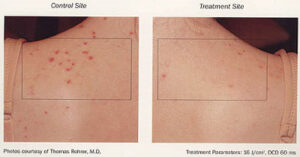About Botox
What is it?
Botox is an extremely popular wrinkle treatment that’s ideal for dynamic wrinkles (wrinkles that form over time from repeated movements, such as smiling or frowning). Derived from Botulinum toxin, Botox is injected through a very fine needle into a muscle underlying a bothersome wrinkle. This process blocks the nerve impulses that move the muscle, causing it to relax. The result is a smoother wrinkle and a softer-looking appearance. Since only the targeted muscle is affected, surrounding muscles continue to move freely, allowing your facial expressions to be easily shown and avoiding the dreaded “frozen face” look when performed by an experienced dermatologist. Botox is ideal for the upper half of the face, including the areas around the eyes, the upper nose, forehead, cheeks, and jaw.
What to expect
A single Botox injection session often lasts under an hour and is virtually painless. You may feel a tingling sensation during the process, but there is no downtime; you can go about your daily routine afterward. Side effects are typically mild and typically include tenderness at the injection site, muscle stiffness or weakness, bruising, itchiness, and swelling.
After the procedure
Within a week after your Botox injections, you should start to notice results, although this can vary from patient to patient. Over the following 3-4 months, the targeted wrinkles gradually vanish, and touch-up injections are suggested every 6 months in order to maintain the rejuvenating effects of the treatment.


